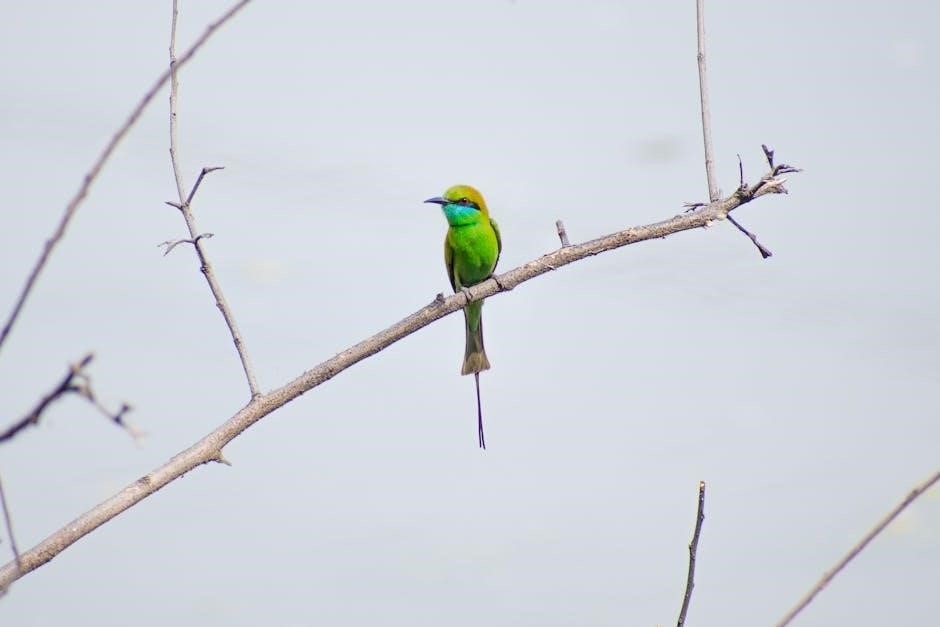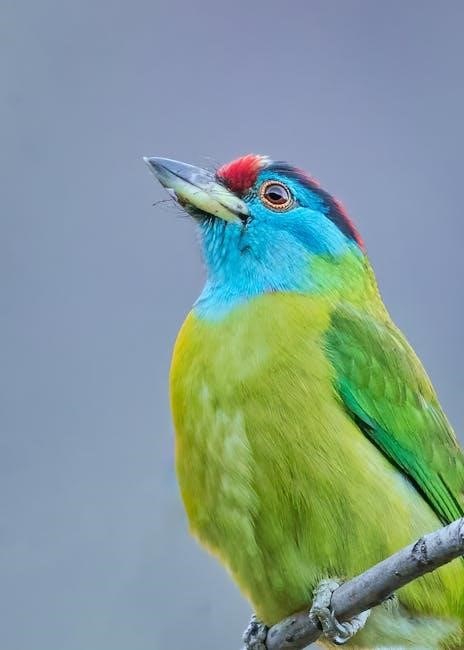Guided by Nature: Exploring the Harmony Between Humans and the Natural World
Discover how aligning with nature fosters balance, well-being, and a deeper connection to the environment. Guided by Nature emphasizes understanding natural systems, promoting stewardship, and finding inspiration in the wild.
Guided by Nature is a philosophy embracing harmony with the environment, fostering meaningful connections and well-being through immersive experiences in the wild.
It emphasizes nature’s role in guiding human behavior, promoting stewardship and emotional attachment to the natural world.
The Significance of Aligning with Nature
Aligning with nature is crucial for fostering balance and harmony in human lives. It promotes emotional well-being, cognitive clarity, and a sense of purpose. By embracing natural rhythms and principles, individuals can cultivate resilience and adaptability. Nature’s inherent balance teaches us to observe life, understand resonance, and find harmony within ourselves and the world. This alignment not only enriches personal growth but also encourages environmental stewardship, emphasizing the importance of preserving natural systems for future generations. Through this connection, we honor nature’s wisdom, leading to a more sustainable and fulfilling existence.
Such alignment is not just a choice but a necessity, as it reflects our inherent link to the earth and its resources. By tuning into nature, we rediscover our place within the larger ecosystem, fostering a deeper appreciation for its beauty and functionality.

Defining “Guided by Nature”: Understanding the Concept

“Guided by Nature” refers to a philosophy and practice where individuals allow natural principles and processes to influence their decisions, behaviors, and way of life. This concept emphasizes living in harmony with the environment, recognizing nature as a source of wisdom and guidance. It involves adopting sustainable practices, respecting ecological balance, and fostering a deep connection with the natural world. The term also encapsulates the idea of nature as a teacher, where its inherent rhythms and patterns provide insights for human well-being and development. By aligning with nature, individuals can achieve a more authentic and fulfilling existence, grounded in the understanding that humans are an integral part of the earth’s ecosystem.
This approach encourages mindfulness, stewardship, and a holistic view of life, where nature’s guidance leads to personal growth and environmental preservation.

The Philosophy of Living in Accordance with Nature
Living in harmony with nature involves embracing its rhythms, respecting its balance, and adopting sustainable practices. This philosophy fosters well-being and environmental stewardship, guiding humans to thrive naturally.
Understanding the Balance of Natural Systems

Natural systems operate harmoniously, with each element interconnected and interdependent. Ecosystems maintain balance through cycles of growth, decay, and renewal. This equilibrium ensures sustainability, teaching humans the importance of preserving biodiversity and respecting nature’s inherent order. By studying these systems, we can mimic their efficiency in our practices, fostering resilience and harmony in both natural and human-made environments. The intricate web of life reminds us that every action impacts the larger ecosystem, guiding us toward sustainable living and environmental stewardship. Embracing this understanding helps us align with nature’s principles, ensuring a thriving planet for future generations.
Humans as Custodians of the Wild: A Shared Responsibility
Humans have a vital role as custodians of the wild, entrusted with preserving the natural world for future generations. This shared responsibility involves protecting ecosystems, promoting biodiversity, and ensuring the sustainability of Earth’s resources. By fostering a deeper connection with nature, individuals can contribute to conservation efforts, whether through participation in guided nature walks or supporting environmental initiatives. The idea of stewardship emphasizes the importance of collective action, where every person’s choices impact the planet. As custodians, we must prioritize the well-being of the environment, honoring nature’s intrinsic value and ensuring its balance. This commitment not only safeguards wildlife but also enriches human lives, creating a harmonious relationship between people and the natural world. Through mindful practices and a sense of duty, we can fulfill our role as guardians of the Earth.
Nature as a Guide for Human Behavior and Decision-Making
Nature serves as a profound guide for human behavior and decision-making, offering timeless lessons in balance, resilience, and harmony. By observing natural systems, we can adopt sustainable practices that mirror the efficiency and adaptability of ecosystems. Mindfulness practices, such as those used in guided nature walks, encourage individuals to slow down, reflect, and align their actions with the rhythms of the natural world. This connection fosters ethical decision-making, as people begin to see themselves as part of, not separate from, the environment. Nature’s cycles teach us patience, renewal, and the importance of living in sync with the world around us. By embracing these insights, humans can make choices that promote well-being for both people and the planet, creating a path toward a more sustainable and compassionate society.

The Science Behind Nature’s Influence on Humans
The science reveals that nature significantly impacts human health and mental well-being, offering emotional and cognitive benefits that enhance overall quality of life naturally.
The Biology of Nature Connection: How It Impacts Health
Nature connection has profound biological effects on human health, reducing stress hormones like cortisol and boosting mood through serotonin production. Exposure to natural environments lowers inflammation, strengthens the immune system, and improves cardiovascular health. Studies show that spending time outdoors increases natural killer cells, vital for fighting infections. The brain also benefits, as nature’s sights and sounds activate the parasympathetic nervous system, promoting relaxation and reducing anxiety. These biological responses highlight nature’s role in preventing chronic diseases and enhancing overall well-being, making it a powerful tool for holistic health.
- Nature reduces cortisol levels, alleviating stress.
- Exposure to green spaces boosts immune function.
- Time outdoors improves mental clarity and emotional balance.
By integrating nature into daily life, individuals can harness these biological benefits, fostering a healthier, more resilient lifestyle.
The Psychology of Being Guided by Nature: Emotional and Cognitive Benefits
Being guided by nature has profound emotional and cognitive benefits, fostering mental well-being and enhancing intellectual function. Immersion in natural environments reduces stress, anxiety, and depression by promoting relaxation and emotional balance. Nature’s calming effects activate the parasympathetic nervous system, lowering cortisol levels and improving mood. Cognitively, exposure to nature enhances creativity, problem-solving skills, and memory. The mental clarity gained from nature connection allows for better focus and decision-making. Additionally, mindfulness practices in natural settings deepen self-awareness and emotional resilience. These psychological benefits highlight nature’s role in nurturing both emotional and cognitive health, making it a vital guide for personal growth and mental well-being.
- Nature reduces anxiety and depression through relaxation.
- Exposure to natural environments boosts creativity and memory.
- Mindfulness in nature enhances self-awareness and resilience.
By embracing nature as a guide, individuals can cultivate emotional harmony and cognitive clarity, leading to a more fulfilling life.

Practical Applications of Being Guided by Nature

Guided nature walks, wellness practices, and mindfulness exercises offer transformative experiences, fostering harmony with the environment and enhancing emotional and physical well-being through immersive outdoor activities.
Nature-Based Wellness Practices: Mindfulness and Therapy
Nature-based wellness practices, such as mindfulness and therapy, offer profound benefits for mental and physical health. By immersing ourselves in natural environments, we can reduce stress, improve emotional well-being, and enhance cognitive function. These practices encourage individuals to connect with their surroundings, fostering a sense of calm and clarity. Mindfulness exercises, such as forest bathing or meditation in nature, help individuals focus on the present moment, reducing anxiety and promoting relaxation. Therapy sessions conducted outdoors leverage the therapeutic effects of nature, providing a supportive environment for personal growth and healing. The combination of nature’s tranquility and structured therapeutic techniques creates a holistic approach to wellness, empowering individuals to achieve balance and resilience in their lives. This harmonious blend of nature and therapy underscores the importance of integrating the natural world into our well-being practices.
Guided Nature Walks: Enhancing Exploration and Learning
Guided nature walks are transformative experiences that deepen our connection with the natural world while fostering learning and exploration. These walks, often lasting 4 to 7 hours, are designed to encourage participants to slow down, observe, and engage with their surroundings. Led by knowledgeable guides, they provide insights into the local ecology, history, and cultural significance of the landscape. By combining physical activity with mental enrichment, these walks promote a sense of curiosity and wonder. They also offer opportunities to learn about biodiversity, geology, and the interconnectedness of natural systems. Whether traversing scenic trails or exploring hidden gems, guided nature walks inspire a greater appreciation for the environment and encourage participants to adopt a more mindful and respectful relationship with nature. These experiences are ideal for those seeking to expand their knowledge while immersing themselves in the beauty of the wild.

Cultural and Historical Perspectives on Nature Guidance
Exploring how diverse cultures have historically viewed nature as a guide, from indigenous wisdom to artistic inspiration, revealing deep connections and reverence across time and traditions.
Indigenous Wisdom: Learning from Native Cultures
Indigenous cultures have long embraced nature as a guiding force, living in harmony with the land through holistic practices. Native traditions emphasize interconnectedness, teaching reciprocity and respect for the environment. Many indigenous communities view nature as a spiritual guide, embedding ecological wisdom into daily life and decision-making. Elders and storytellers pass down knowledge about sustainable living, ensuring future generations understand their role as stewards of the wild. This wisdom highlights the importance of balance, offering timeless lessons for modern societies seeking to reconnect with the natural world. By honoring indigenous perspectives, we gain insights into living in sync with nature, fostering resilience and harmony for all.
Nature in Art and Literature: A Source of Inspiration
Nature has long been a profound source of inspiration in art and literature, shaping creativity and sparking imagination. From the serene landscapes of Romantic-era paintings to the vivid descriptions in wilderness literature, nature’s beauty and complexity have influenced countless artists and writers. Authors like Wordsworth and Thoreau drew deeply from natural surroundings, using them as metaphors for human emotions and existential reflections. Similarly, composers and poets have often found solace and muse in nature’s rhythms and symmetries. This timeless connection highlights nature’s role as a universal guide, offering lessons in harmony, resilience, and the interconnectedness of life. By exploring these works, we see how nature continues to inspire artistic expression, fostering a deeper appreciation for the natural world and our place within it.

Environmental Advocacy and Stewardship
Guided by nature, environmental advocacy emphasizes protecting ecosystems and promoting sustainability. Conservation efforts focus on preserving biodiversity, while stewardship encourages responsible land management and ethical practices to ensure a balanced natural world.
Conservation Efforts: Protecting Natural Heritage
Guided by nature, conservation efforts aim to preserve ecosystems and biodiversity for future generations. Collaborations, like those between Guided by Nature and the Tasmanian Walking Company, emphasize sustainable tourism and responsible land management. These initiatives promote immersive experiences, such as multi-day hikes, that foster a deep connection with natural environments while supporting local cultures. By prioritizing ecological balance, conservation programs educate participants about the importance of protecting untouched landscapes and wildlife. Such efforts not only safeguard natural heritage but also encourage individuals to adopt environmentally conscious practices. Through mindful exploration and stewardship, these initiatives inspire a collective responsibility to defend the planet’s fragile ecosystems, ensuring their integrity for years to come.
Sustainable Living: Guided by Nature’s Principles
Embracing sustainable living means adopting practices that align with nature’s inherent wisdom. By understanding natural cycles and processes, individuals can reduce their environmental impact while enhancing well-being. This approach encourages the use of renewable resources, eco-friendly technologies, and mindful consumption. Guided by nature, sustainable living promotes harmony between human activities and the natural world, fostering resilience and balance. Through these principles, communities can create thriving ecosystems that support both people and the planet, ensuring a healthier, more sustainable future for all. Nature’s guidance offers a timeless blueprint for living in sync with the environment, benefiting both personal and global well-being. By integrating these principles into daily life, individuals contribute to a world where sustainability is not just a goal, but a way of life. This mindful approach ensures that future generations inherit a vibrant, intact natural world.
Embracing a life guided by nature invites us to reconnect with the world around us, fostering harmony and balance. By aligning our actions with natural principles, we cultivate a deeper appreciation for the environment and our place within it. This journey encourages mindfulness, sustainability, and a sense of responsibility toward preserving the planet. Through nature’s wisdom, we find inspiration for personal growth, emotional well-being, and a more meaningful existence. As we adopt this guiding philosophy, we not only enhance our own lives but also contribute to a healthier, more sustainable future for generations to come. Let nature be your compass, leading you toward a life of purpose, connection, and harmony with the world around you.



